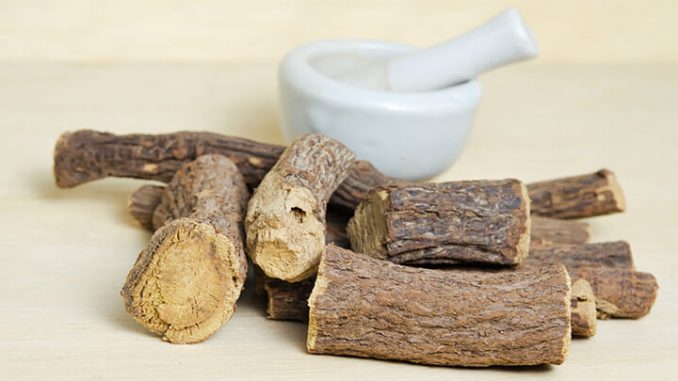
Licorice is something you’ll always find in my grandma’s house. When we suffered from a sore, scratchy throat, she’d always give us a candy. At the time, it seemed like a good trade off to me. As I grew older, I wasn’t exactly a fan of licorice, but my grandma will forever love it. Wherever I travel to, I track down a type of licorice she has never tried before. Most recently, I found a bag of licorice salt water taffy from the east coast of Canada.
I was always looking in the candy section, until one day, I noticed licorice tea. I was a little taken back by it. After looking into its history and use, I realized that licorice is much more than my grandma’s favorite candy. It can also act as a means to heal — here’s how.
Reasons to drink licorice root tea
Between my English husband and I, we drink a whole lot of tea. He’s more into his traditional “cuppa,” whereas I love herbal teas. Of course, tea is associated with food and even social time, but many do not realize the potent properties found in tea varieties. Whether you’re a fan of licorice or not, here’s why you should gladly slurp back a mug or two.
1. Improve poor mood
We all feel down in the dumps once in awhile and that is part of being human. We experience ups and downs as we make our way through life. But unfortunately, for approximately 15 million adults, they experience more than a few “bad” days. Mood disorders like depression can significantly reduce one’s quality of life. And for those who are suffering, medication is not the only answer.
In many cases, patients are given antidepressants that come with a long list of side effects. Although they’re handed out like candy, these powerful medications not only interact with your liver, heart and brain, but they actually contribute to significant death rates, including stillbirths.
It’s an awful reality. And if you can relate to this mental health experience, you need to know that there are more options out there. You do not need to be a slave to prescription pills. While studying the effect of licorice extract on mice, researchers found that it significantly reduced immobility times within a forced swim test and tail suspension test. In fact, the effect of licorice was similar to that of two common antidepressants, fluoxetine (Prozac) and imipramine (Trofinal).
After further investigation, researchers found that licorice appeared to increase levels of norepinephrine and dopamine, but not serotonin. Based on the antidepressant effects observed, the researchers concluded that licorice extract may, in fact, offer an alternative remedy for depression.
2. Improve symptoms of PMS and menopause

Ladies, you know all too well how uncomfortable and even painful menstrual cramps can be. No one wants to experience these cramps, or PMS for that matter. Far too many women rely on over-the-counter pain medications, popping ibuprofen like it’s going out of style.
Within the Western approach to medicine, this is the norm. And to be honest, while with friends, I sometimes cannot believe how quick they are to pop just about anything to make them feel better. It’s not only shocking but alarming — especially when traditional Chinese medicine is so effective.
For thousands of years, people have utilized herbs — like licorice — based on their potent healing properties, without the associated risks of pharmaceuticals. With the traditional Chinese medicine approach, healers focus on the twelve “channels” of your body. It’s actually quite remarkable, as each channel represents an energy highway. Basically, these channels can be mapped throughout the body. And unlike Western doctors, traditional Chinese practitioners access the energy of the body to encourage the healing process.
Licorice root and PMS symptoms
Licorice root is one of the few herbs that is known to go to all twelve channels. In turn, it can act as a guide for other herbs that would not normally enter these channels. While focusing on PMS and cramps, licorice root is able to better control spasms and reduce associated pain.
Rich in antioxidants known as flavonoids, this traditional herb will also promote healthy circulation and reduce inflammation — helping to relieve tissue damage. Similarly, based on its estrogen-like effects, licorice has also been shown to reduce symptoms of menopause and PMS.
While studying the effect of licorice on the recurrence of menopause, researchers focused on one of the most distressing symptoms — hot flashes. Researchers divided women into two groups, focusing on those who consumed a placebo and those who took three 330 milligrams capsules of licorice daily.
Researchers found that licorice root decreased the frequency and severity of hot flashes. The researchers concluded that this herb is a harmless, inexpensive remedy that should be taken in conjunction with continuous physical exercise. So, the next time you’re cramping up, or if you’re currently going through menopause, don’t be shy to brew a licorice tea.
3 Reduces inflammation and treat ulcers

Inflammation is essentially your body’s reaction to injury. In cases such as arthritis, the immune system triggers an inflammatory response when there’s nothing to fight. Based on these autoimmune diseases, the otherwise protective immune system begins to damage its own tissues, resulting in chronic inflammation.
Unfortunately, there are consequences of too much inflammation. These include the development of heart disease and cancer. For those who do not suffer from an autoimmune disease, increased inflammation is most certainly a reason to rethink your lifestyle. Trans fats, for instance, are known to cause inflammation by damaging the cells within the lining of blood vessels.
Although high-sugar foods and other harmful ingredients are known to cause inflammatory responses, you can just as easily counteract those effects with healthier, anti-inflammatory options. Although licorice has been used throughout ancient history, it’s only recently that we’re able to uncover its true potential.
Research on licorice and inflammation
A number of recent studies have uncovered the anti-inflammatory properties of licorice. Within one study, published in Shock, researchers found that licorice had a significant effect on symptoms following a spinal cord injury. After researchers administered licorice root following injury, they saw a reduction in inflammation, swelling, cell death and tissue damage.
Although positive effects have been reported regarding inflammatory skin conditions, some of the most promising research has focused on stomach ulcers. While suffering from a peptic ulcer, you’re essentially experiencing inflammation in the lining of the stomach or duodenum.
Although patients are often prescribed a proton pump and antibiotics, due to increasing resistance, other strategies need to be explored. Within herbal medicine, licorice has been shown to produce significant anti-ulcer effects. Within one key double-blind study, researchers confirmed that licorice is not only effective when treating ulcers, but is also a low-cost solution and highly tolerated by patients.
4. Improve heart health and cholesterol levels

Heart disease is another unfortunate reality that far too many individuals face. It’s the number one cause of death across the world. This disease takes the lives of approximately 375,000 Americans each year. If you knew that you could avoid heart complications in the future, would you take action now?
Licorice root has once again been shown to heal the body, targeting both cholesterol and atherosclerosis risk. Within one 2016 study, published in Food & Nutrition Research, licorice root was examined in terms of carotid intima-media thickness (CIMT) — a measurement that is used to determine the of the two inner layers of the carotid artery.
While studying patients with high cholesterol, researchers found that licorice produced positive effects. In fact, after following one year of licorice consumption, researchers found that mean CIMT, total cholesterol, blood pressure and LDL levels all decreased. The researchers concluded that licorice may reduce one’s risk of atherosclerosis, as well as other related cardiovascular diseases.
If you currently have heart disease, it’s important to discuss this treatment option with your doctor. Although herbs can strengthen the body and treat disease, they often contain compounds that interact with medications. Like any new regimen, it’s important to reassess the medications you are currently on. Discuss new, natural options with a homeopathic doctor.
5. Reduce body fat
Obesity is currently an epidemic that is sweeping the nation, leading to a wide range of serious health effects. Many individuals have tried to lose the same 10 pounds for years. So how is it that they’re not succeeding? There are so many “trendy” diets out there, it’s tough to keep track. And in reality, you think that they would help individuals reach their goals.
The sad truth is, many companies are out to get rich at the expense of people’s health. Without making significant changes to your lifestyle, you will not achieve sustainable results. It’s all about changing your mindset, focusing on what you eat, how often you exercise and even how well you manage stress.
Green tea has long been deemed a positive solution for weight-loss, but licorice tea can also help you boost your efforts. While studying the effects of licorice flavonoid oil, researchers found that this treatment could reduce both visceral fat and total body fat. To come to this conclusion, researchers assigned participants to one of four groups.
Researchers gave the first group zero licorice extract, while the remaining three groups received either 300, 600 or 900 milligrams daily. After eight weeks, although caloric intake was similar across all four groups, total body fat mass decreased significantly among all three treatment groups. These individuals experienced no adverse effects, yet benefited from decreases in BMI, body weight, visceral fat and LDL cholesterol.
How to prepare licorice root tea
Whether you are suffering from a cold, improve adrenal health, or need to address any of the conditions discussed above, licorice root tea is an excellent way to improve positive wellness. Of course, you can find organic licorice root tea at your local health store, as well as your local supermarket. However, when you make your own, there’s no comparison.
Ingredients
- 1/2 cup dry licorice root
- 1/4 cup dried orange peel
- 1 tbsp whole cloves
- 1 tbsp cinnamon
Instructions
1. Combine all of the above ingredients and store in a glass jar.
2. When ready to brew tea, simply combine 1 tbsp of tea mix with 2 cups of water. Bring to a boil and simmer for 5 to 6 minutes.
3. Strain and enjoy.
The next time you see licorice candies in the store, allow those sweet treats to act as a reminder. Experiment with various combinations, creating a licorice root tea that you’ll happily enjoy time and time again.
This year, for Christmas, I am making all kinds of handmade goodies for my family and premixed tea jars are most certainly a special gift that will keep on giving. Whether you want to give this recipe as a gift or make it for yourself, you will be giving and receiving the greatest gift of all — positive health.
— Krista Hillis
